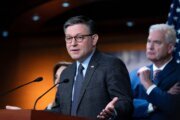ANDREA RODRIGUEZ
Associated Press
HAVANA (AP) — Members of Colombia’s military met face-to-face Friday with Marxist rebel leaders for the first time as talks aimed at ending a half-century war enter a decisive phase.
Peace negotiations with the Revolutionary Armed Forces of Colombia taking place in Cuba’s capital the past two years still face a number of obstacles. Among those is widespread concern in Colombia that atrocities committed by the FARC will go unpunished, and Colombians are likely to be given the right to vote on any deal in a referendum.
But reflecting mounting optimism that a deal is within reach, recently re-elected President Juan Manuel Santos decided to send some of the Colombian military’s most-decorated officers to Havana to begin informal discussion on how to carry out any end to hostilities and an eventual cease-fire.
Leading the delegation is Gen. Javier Flores, head of Colombia’s joint chiefs of staff. He’s one of the FARC’s fiercest battlefield adversaries, having earned his stripes as the head of an elite, U.S.-trained unit that took out several members of the FARC’s governing secretariat, including its once feared military head, Victor Julio Suarez, better known by his alias “Mono Jojoy.”
Negotiators offered almost no details of the encounter and the officers were set to return Friday evening to Bogota.
But Ivan Marquez, the head rebel negotiator, said the presence of the active-duty officers was “excellent news” that lays bare the progress being made. It follows negotiators’ meetings last week with relatives of some of the victims of Latin America’s longest-running conflict — a war that has seen 200,000 people, mostly civilians, killed by guerrillas, military and right-wing militias.
“It’s of unobjectionable value that for the first time active duty representatives of the armed forces of each side … are sitting at the table in equal conditions,” Marquez said.
“Let’s get rid of our uniforms,” he urged.
Not everyone celebrated the military’s involvement in the talks. Former Colombian President Alvaro Uribe, who has been leading opposition to the peace talks, blasted Santos on Twitter, saying troop morale would suffer as a result.
“There’s no worse treatment of soldiers and police officers than putting them on equal footing with terrorists,” he tweeted.
Humberto de la Calle, the government’s chief negotiator, cautioned that the presence of the uniformed officers in no way signals the government is bending to rebel demands that military operations be halted while talks continue.
“Let me be absolutely clear: We’re not negotiating a cease-fire now,” de la Calle said.
The military officers’ work is “limited to preparing possible mechanisms for the future that will only be enacted the moment we reach an agreement,” he said.
___
Associated Press writers Joshua Goodman and Cesar Garcia in Bogota, Colombia, contributed to this report.
Copyright 2014 The Associated Press. All rights reserved. This material may not be published, broadcast, rewritten or redistributed.







